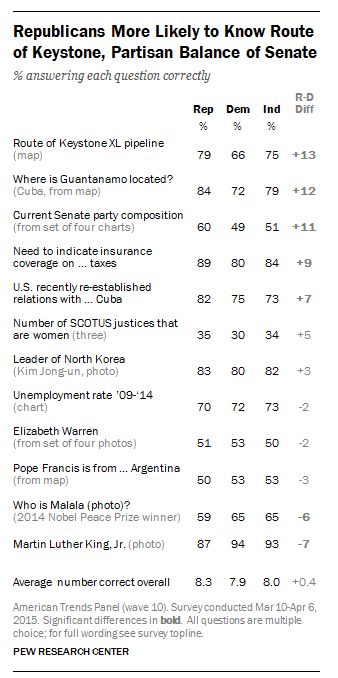What Your Party Affiliation Says About Your Trust in Media


Quinnipiac University and Pew Research released polling results this week on voters' attitudes on the media and how knowledgeable they were about current and historical events. As previously covered on IVN, the knowledge gap between Republican and Democratic voters is persisting. The phenomenon is likely related to declining trust in traditional media sources.
None of the major networks (NBC, ABC, CBS, MSNBC, CNN, and Fox News) were trusted 'a great deal' by more than 20 percent of respondents in the Quinnipiac poll. However, when the numbers are broken down by party affiliation, a very different picture emerges.
Fifty-eight percent of GOP voters reported trusting Fox News the most, whereas 32 percent of Democrats went with CNN. The survey also found:
"American voters say 48 – 7 percent that network TV news is less trustworthy than in the days of Walter Cronkite, while 35 percent say it is about as trustworthy."
Not only are voters divided on what news outlets to trust, they are also divided on what news they get. Pew Research Center's News IQ quiz found a compelling disparity between party affiliation and knowledge of key current events like the route of the proposed Keystone XL pipeline, the geographical location of Guantanamo Bay, and the current partisan composition of Congress.
Pew found:
"On average, Republicans, Democrats and independents each answer about eight of twelve knowledge questions correctly. More Republicans than Democrats could identify the route of the proposed Keystone XL pipeline from a map (79% vs. 66%) and locate the U.S. military prison at Guantanamo on a map (84% of Republicans and 72% of Democrats select Cuba)."
Independents outperformed both Republicans and Democrats when it came to knowing the unemployment rate -- 73 percent answered correctly. They were just as likely as Democrats (65 percent) to know the 2014 Nobel Prize winner, Malala Yousafzai, and almost equally as bad as Republicans (34 percent) at knowing there are three female Supreme Court justices.
Photo Credit: DeshaCAM / Shutterstock.com


